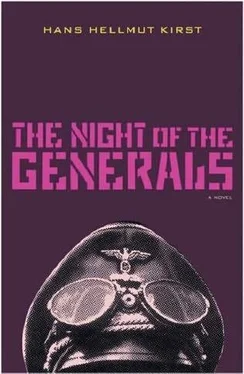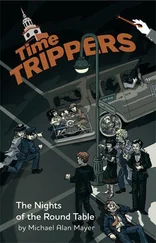INTERIM REPORT
EXTRACTS FROM VARIOUS LETTERS
Letter 1, written eighteen years after the events described here.
Sender: Professor Dr Kahlert. Resident at Münster, Westphalia, between 1945 and 1946. Active in the field of popular education and contributor to several periodicals. Moved to Berlin in 1947, where he has since been closely associated with nationalist groups. The following are excerpts from Kahlert’s written depositions, reduced to bare essentials: “I was attached to General von Seydlitz-Gabler’s staff, first as a lieutenant and later as a captain. One of my duties, which I still recall with pride today, was to keep the Corps’ war diary.
“The General trusted me implicitly, a sentiment which was fully reciprocated. I regarded him as a born commander-in-chief, and history has confirmed that he was one of the Fatherland’s greatest strategists.
“Apart from that, however, General von Seydlitz-Gabler was what might be termed a philosopher. His utterances, which I was privileged to record in writing, were couched in global terms. This has become clear only in latter years. As he told me during the Polish campaign, for instance: ‘To be the dung of humanity is a tragic thing but a useful one.’ Again, when we were alone once, during the conquest of France, the General said: ‘The impulse towards what is good and right is comparable with the pangs of childbirth: we must overcome it if it is not to destroy us.’
“I can provide you with further striking examples of his insight, and shall be glad to do so in my humble capacity as an historian. I shall never forget something he said during the Russian campaign, one evening when we were sharing a bottle of Mâcon together. I recorded it verbatim. ‘We have a weary road to tread,’ he said, ‘and it may well be that only posterity will fully understand us. What seems a daring pipe-dream today will go down in history as a piece of modest realism.’
“You make repeated inquiries about his wife. I can assure you that, whatever the occasion, she showed herself worthy of him. I was privileged to see them together at many crucial moments, and I can only say that I have never met a finer embodiment of the phrase ‘Whither thou goest I will go’. Their relationship was one of mutual dependence. I shall always remember the time she turned to him one evening after a Chopin recital and said: ‘Real human values, Herbert—how could we recognize them if they weren’t within us?’
“As to the child of this fortunate marriage, I fear that I cannot give you very much information. The young lady’s name was Ulrike, and I regret to say that she was living proof of the age-old theory that prominent men rarely produce offspring worthy of them. There was something ill-starred about her. She had a father who left his mark on history, but how many children are capable of recognizing parental greatness?”
Letter 2, also written nearly eighteen years after the events described here.
Sender: Otto, occasionally known as Otto the Fat. The following passages are also in extract form: “General Kahlenberge was quite something, you can take it from me. I was with him for years and he never gave me a dull moment. He had X-ray eyes and ears like wireless aerials. I often used to think—that fellow could hear a sparrow fart at ten paces!
“Kahlenberge had a sort of sixth sense for everything that went on round him. He could always tell when the G.O.C. was on the war-path or when he was going to be easy meat. He was the sort of chap who could give you tomorrow’s weather forecast or next week’s casualty figures in advance. He was so sharp it took my breath away sometimes.
“He was probably the only brass-hat who never tried to shoot us a line. If someone started talking about dying like a hero he’d say it was all a question of keeping a tight arsehole, and when he saw a slogan like ‘The Fatherland Calls!’ he’d say ‘They’re after our money again.’ He also liked to talk about ‘the Greater German sewer-rat’ (meaning our revered Führer and Supreme Commander)—and when he said ‘shit’ you could smell it!
“Kahlenberge could twist anyone round his little finger. He was a ball of fire. The G.O.C. may have had big ideas, but where would he have been without Kahlenberge? He really ran the show, and I helped him do it.”
Letter 3, also written eighteen years later.
Sender: ex-Colonel Sandauer, currently a senior provincial government official. Owns a private residence in the Swabian Alps near Geislingen-Steige. Sandauer’s written remarks are reproduced here unabridged: Geislingen-Steige, November 9, 1960 “Dear Sir, I must apologize for the fact that pressure of work has prevented me from replying to your letter until now. Although I am only too willing to answer your questions, I fear that my answers will prove of very little value because my knowledge of the more intimate details is extremely limited.
“You are correct in saying that I served under Lieutenant-General Tanz in the Nibelungen (Special Operations) Division. I was his G.S.O.1 for nearly two years, from 1942 until 1944, successively holding the ranks of major and later lieutenant-colonel. My duties were not of the easiest, but I did my best to perform them conscientiously and efficiently.
“No form of personal contact existed between myself and the General, a fact which would surprise no one who had any knowledge of that unusual man. He was unapproachable in the truest sense of the word. He had no private life and was completely wrapped up in his work.
“At the time, General Tanz struck me as an ideal soldier, but I should like to emphasize that I can only judge by what I saw during the two years I served under him. Moreover, my observations must necessarily be subjective and incomplete. General Tanz would not tolerate weakness or contradiction. He gave his orders and we carried them out. Suggestions were offered only when he asked for them, and any sort of discussion was unthinkable.
“You make a point of asking about the General’s human qualities and mention the incident in Potocki Avenue, when he gave the Polish children his rations. I can only say—he was like that. He enjoyed eating in field kitchens surrounded by his men. On more than one occasion I saw him give a dying man a last drink from his canteen, and he once offered an old woman a lift from one village to the next in his car. He always treated women with exemplary courtesy. Although he never drank spirits or smoked himself, he made a practice of sharing out his cigarette ration among the troops or members of the civil population. You can read further details of a similar nature in army newspapers, of which I should be glad to send you any particular copy on request.
“I should be genuinely grateful if you would make every effort not to abuse my confidence. Misunderstandings of a painful and even dangerous nature can arise only too easily these days. It is true that we have not yet been as successful as we could wish in overcoming our past, but it is surely incumbent on us all to do so as speedily and effectively as possible.
“Trusting that you will understand my position, Yours very truly, Sandauer”
The intimate little luncheon party to be given by the Corps Commander, General von Seydlitz-Gabler, was evidently a function of some importance, for Frau Wilhelmine had taken all the preparations under her personal supervision. The orderlies were having a dismal morning of it, and they were not the only ones. A. D. C., staff supervisor, head cook, orderly officers and female personnel were all going through hell.
“I wonder if I might ask you?” was the mode of address normally adopted by Frau Wilhelmine on such occasions. TheGeneralin did not exactly give orders or issue directives. She had no right to. She merely requested, but when she made a request it had all the force of an order of the day issued by the G.O.C. himself.
Читать дальше












